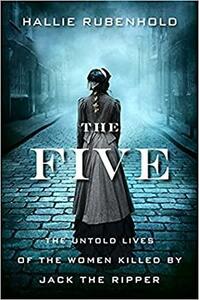Take a photo of a barcode or cover
informative
reflective
sad
fast-paced
challenging
dark
sad
medium-paced
I've been meaning to read this for years and gosh it was worth the wait.
dark
emotional
informative
mysterious
sad
medium-paced
dark
informative
sad
medium-paced
challenging
emotional
informative
medium-paced
“The victims of Jack the Ripper were never ‘just prostitutes’; they were daughters, wives, mothers, sisters, and lovers. They were women. They were human beings, and surely that in itself is enough.”
I don’t often do reviews for non-fiction books for two reasons:
A) I don’t read a lot of non-fiction in the first place, something I would like to rectify, and
B) It feels strange rating non-fiction books… like I was rating a textbook or something.
That being said, after reading this book, I just knew I had to talk about it. This was a non-fiction that had me wishing I had been assigned this book in school. It does the thing that I need in this genre to not be bored out of my skull: it was engaging and was never dry, even when the author was reciting data and numbers from Victorian London.
It helps that this book was on a topic that I found singularly fascinating. It focuses on the lives of the women who were killed by the infamous serial killer, Jack the Ripper. What I loved so much about this book was that it truly focused on just the victims. The killer is mentioned here or there, it would be kind of impossible not to, but there is never a focus on his possible motives or who he might have been. Hallie Rubenhold does an admirable job of making sure the lives of Polly, Annie, Elizabeth, Catherine and Mary-Jane are what we really dive into throughout the book. I think that’s why I enjoyed this book so much. It was refreshing to have the spotlight on the victims instead of the perpetrator.
I also think the author did an incredible job with researching this topic. From what I could gather, it certainly wasn’t easy! Records on all five of the women aren’t exactly as complete as a historian might wish, after all. This does lead to a lot of “Polly may have done such…” and “Elizabeth would have done this…”, which could be a little bothersome. I understood why the author did it, though, because there is no real way of knowing for sure what these women did. Still, I think the author drew some pretty solid conclusions from the information she was able to find.
Final thoughts: This was an incredibly well-written true crime story that put the spotlight firmly where it should be: on the victims. There is quite a bit of conjecture in this book as records weren’t terribly great for the poor in Victorian London, but I think Hallie Rubenhold did a fantastic job researching and writing a compelling book with the information she had. This was intensely readable and I would definitely pick up a non-fiction from her in the future!
I don’t often do reviews for non-fiction books for two reasons:
A) I don’t read a lot of non-fiction in the first place, something I would like to rectify, and
B) It feels strange rating non-fiction books… like I was rating a textbook or something.
That being said, after reading this book, I just knew I had to talk about it. This was a non-fiction that had me wishing I had been assigned this book in school. It does the thing that I need in this genre to not be bored out of my skull: it was engaging and was never dry, even when the author was reciting data and numbers from Victorian London.
It helps that this book was on a topic that I found singularly fascinating. It focuses on the lives of the women who were killed by the infamous serial killer, Jack the Ripper. What I loved so much about this book was that it truly focused on just the victims. The killer is mentioned here or there, it would be kind of impossible not to, but there is never a focus on his possible motives or who he might have been. Hallie Rubenhold does an admirable job of making sure the lives of Polly, Annie, Elizabeth, Catherine and Mary-Jane are what we really dive into throughout the book. I think that’s why I enjoyed this book so much. It was refreshing to have the spotlight on the victims instead of the perpetrator.
I also think the author did an incredible job with researching this topic. From what I could gather, it certainly wasn’t easy! Records on all five of the women aren’t exactly as complete as a historian might wish, after all. This does lead to a lot of “Polly may have done such…” and “Elizabeth would have done this…”, which could be a little bothersome. I understood why the author did it, though, because there is no real way of knowing for sure what these women did. Still, I think the author drew some pretty solid conclusions from the information she was able to find.
Final thoughts: This was an incredibly well-written true crime story that put the spotlight firmly where it should be: on the victims. There is quite a bit of conjecture in this book as records weren’t terribly great for the poor in Victorian London, but I think Hallie Rubenhold did a fantastic job researching and writing a compelling book with the information she had. This was intensely readable and I would definitely pick up a non-fiction from her in the future!
dark
informative
You can’t sell a book as the untold stories of the victims of Jack the Ripper when most of this is unnecessary details about their families. Accept there is barely any records on them and maybe focus on the misogyny surrounding the cases.
dark
informative
mysterious
sad
medium-paced




